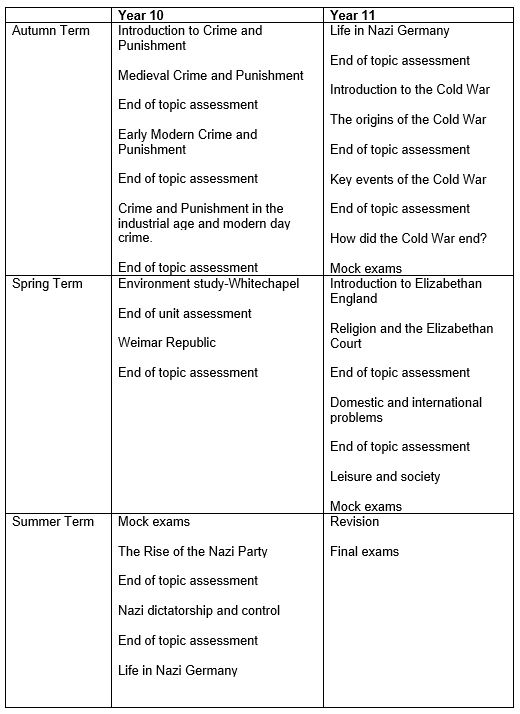KS4 History
Curriculum Intent
History at Murray Park School will grow a generation of young people who are passionate, curious and active citizens in Derby. Our History curriculum will help students to make sense of the world they live in, and will help them to cement their place within their city. We aim to equip students by developing their knowledge and understanding of the past and helping them understand how and why things have changed.
A key aim of the Murray Park History curriculum is to challenge and re-examine traditional narratives, and give students the opportunity to learn about histories other than the traditional canon of British historical education. The curriculum is therefore a vehicle to promote social justice and the common values of diversity, tolerance, equality and democracy. KS4 History aims to create knowledgeable, engaged and resilient learners; students who are equipped with a Historical understanding and skill set that allows them to develop and succeed beyond their own lived experiences.
The aims and objectives of this qualification are to enable students to:
- develop and extend their knowledge and understanding of specified key events, periods and societies in local, British, and wider world history; and of the wide diversity of human experience.
- engage in historical enquiry to develop as independent learners and as critical and reflective thinkers. Students will develop an awareness and understanding of key second order concepts. These are: causation, consequence, similarity, difference, change, continuity and significance.
- develop the ability to ask relevant questions about the past, to investigate issues critically and to make valid historical claims by using a range of sources in their historical context.
- develop an awareness of why people, events and developments have been accorded historical significance and how and why different interpretations have been constructed about them.
- organise and communicate their historical knowledge and understanding in different ways and reach substantiated conclusions.
Curriculum Overview
Course outline and structure – GCSE History
Exam Board: Edexcel
The Pearson Edexcel GCSE (9–1) in History consists of three externally examined papers that students will sit in the summer of Year 11. This course offers a diverse and comprehensive coverage of aspects of human History that are both pertinent to understanding our world today, with all of its challenges; and the study of the past.
The course covers a swathe of British History through the lens of Crime and Punishment from the Middle Ages to the present day as well as tackling questions of power, privilege and society in Elizabethan England.
We hope that we provide a relevant, modern, curriculum to prepare students for life in the 21st Century, allowing them to use what they know to judge the future by the past and to engage in making their own history in a conscious manner.
Paper 1: Thematic study and historic environment.
Written examination: 1 hour and 15 minutes (30%* of the qualification.)
In Year 11 students study Crime and punishment in Britain, c1000–present. Students also have an environment study on Whitechapel, c1870–c1900: crime, policing and the inner city. The thematic studies require students to understand change and continuity across a long sweep of history, including the most significant characteristics of different ages from the medieval to modern periods. They include people, events and developments and reveal wider changes in aspects of society over the centuries and allow comparisons to be made between different periods of history.
Paper 2: Period study and British depth study.
Written examination: 1 hour and 45 minutes (40%* of the qualification.)
Students complete paper 2 at the start of year 10. Students start with Superpower relations and the Cold War, 1941–91. Students explore the origins of the Cold War, the key events and then the ending of the Cold War. The final unit of the GCSE course is the second topic of paper 2, Early Elizabethan England, 1558–88. Students investigate Elizabeth’s court, her domestic and international problems including whether this really was a ‘Golden Age’.
Paper 3: Modern depth study.
Written examination: 1 hour and 20 minutes (30%* of the qualification.)
The depth studies focus on a substantial and coherent short time span and require students to understand the complexity of a society or historical situation and the interplay of different aspects within it. Students study the depth study in year 10. The depth study, Weimar and Nazi Germany, includes the creation of the Weimar Republic, The Rise of Nazi Party, the creation of the Nazi state and life in Nazi Germany.
The total qualification mark is 168, of which 8 marks are for spelling, punctuation, grammar and use of specialist terminology (SPaG).

Extra-curricular activities
The department plans to offer a number of curriculum-related trips. We are hoping to take students to Whitechapel as part of the environment study.
KS4 students get the chance to attend the trip to Berlin or the trip to Krakow that run on alternate years. We have arranged a visit to Auschwitz in Poland. We also have a partnership with the Holocaust Trust and we will be welcoming them to Murray Park.
There is also a KS4 Debate and Politics club. We meet weekly and run mock debates and trials throughout the year. We take part in the Derby city debate competition with the University of Derby. Students have the opportunity to work with trainee law students and current solicitors to improve their debating skills.
Useful websites
https://qualifications.pearson.com/en/qualifications/edexcel-gcses/history-2016.html

